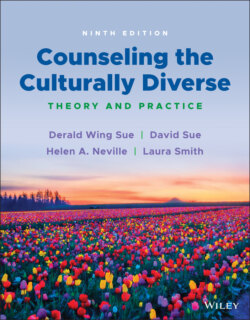Читать книгу Counseling the Culturally Diverse - Laura Smith L. - Страница 58
WHAT IS MULTICULTURAL COUNSELING AND THERAPY?
ОглавлениеIn light of the previous analysis, let us define multicultural counseling and therapy (MCT) as it relates to the therapy process and the roles of the mental health practitioner:
Multicultural counseling and therapy can be defined as both a helping role and a process that uses modalities and defines goals consistent with the life experiences and cultural values of clients; recognizes client identities to include individual, group, and universal dimensions; advocates the use of universal and culture‐specific strategies and roles in the healing process; and balances the importance of individualism and collectivism in the assessment, diagnosis, and treatment of client and client systems. (Sue & Torino, 2005)
This definition often contrasts markedly with traditional views of counseling and psychotherapy. A more thorough analysis of these characteristics is described in Chapter 3. For now, let us extract the key phrases in our definition and expand their implications for clinical practice.
1 Helping role and process. MCT broadens the roles that counselors play and expands the repertoire of therapy skills considered helpful and appropriate in counseling. The more passive and objective stance taken by therapists in clinical work is seen as only one method of helping. Likewise, teaching, consulting, and advocacy can supplement the conventional counselor or therapist role.
2 Consistent with life experiences and cultural values. Effective MCT means using modalities and defining goals for culturally diverse clients that are consistent with their racial, cultural, ethnic, gender, and sexual‐orientation backgrounds. Advice and suggestions, for example, may be effectively used for some client populations.
3 Individual, group, and universal dimensions of existence. As we have already seen, MCT acknowledges that our existence and identity are composed of individual (uniqueness), group, and universal dimensions. Any form of helping that fails to recognize the totality of these dimensions negates important aspects of a person's identity.
4 Universal and culture‐specific strategies. MCT believes that different racial and ethnic minority groups might respond best to culture‐specific strategies of helping or culturally adaptive interventions. Such counseling takes into consideration how the client defines or understands their concern over and incorporation of culturally relevant concepts such as intergenerational stress, face‐saving, cultural mistrust, and racial and ethnic socialization.
5 Individualism and collectivism. MCT broadens the perspective of the helping relationship by balancing the individualistic approach with a collectivistic reality that acknowledges our embeddedness in families, relationships with significant others, communities, and cultures. A client is perceived not just as an individual, but as an individual who is a product of his or her social and cultural context.
6 Client and client systems. MCT assumes a dual role in helping clients. In many cases, for example, it is important to focus on individual clients and to encourage them to achieve insights and learn new behaviors. However, when problems of clients of color reside in prejudice, discrimination, and racism of employers, educators, and neighbors or in organizational policies or practices in schools, mental health agencies, government, businesses, and society, the traditional therapeutic role appears ineffective and inappropriate. The focus for change must shift to altering client systems rather than individual clients.
